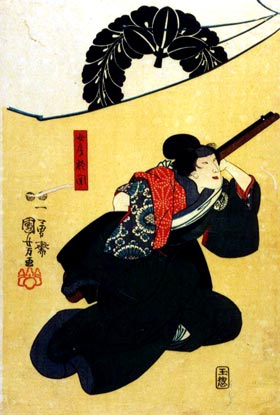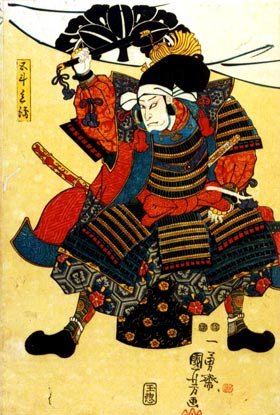| GOTO TEPPďBA |
| Play titles | Yoshitsune Koshigoej˘ Fűkigusa Aioi Genji |
| Common titles | Goto Tepp˘ba Tepp˘ba |
| Authors | Chiros˘ Shujin (the master of the Thousand Butterburs Villa) (it might be the penname of the playwright Namiki Eisuke I) Toyotake ďritsu (1770 revision) |
| History |
The play "Yoshitsune Koshigoej˘" was originally written for the puppet theater (Bunraku) and staged for the first time in the 7th lunar month of 1754 in ďsaka at the Toyotakeza. It was a revision of two early plays, Namiki S˘suke's "Nanbantetsu Got˘ no Menuki" (1735) and "Yoshitsune Shin Fukumij˘" (1744). The title, which suggested that the play focused on Minamoto no Yoshitsune, was in fact dealing with the siege of the ďsaka Castle, led by Tokugawa Ieyasu to destroy the Toyotomi clan in 1614 and 1615. This play was quickly forbidden because of the 4th act in which Gotobŕ's wife fired a gun at Yoritomo (this was of course interpreted as an attack on the Shogunate). "Yoshitsune Koshigoej˘" was revised in 1770 by Toyotake ďritsu, who completely rewrote the 4th act for a puppet production at the Kitahorieza in ďsaka. Here is the table of character tranlation between the drama and history: Regarding the adaptation of this drama to Kabuki, the very first one was was staged in the 11th lunar month of 1754 at Hoteiya Umenoj˘'s theater in Ky˘to as the kaomise drama "Fűkigusa Aioi Genji" [more details]. The script (unknown playwright) was similar to "Yoshitsune Koshigoej˘"'s one but there were a few differences, the most important one was the name of the strategist (Gotobŕ in "Yoshitsune Koshigoej˘", T˘saku in "Fűkigusa Aioi Genji"). It was staged under the title of "Yoshitsune Koshigoej˘" for the first time in the 12th lunar month of 1761 in ďsaka within the precincts of the Tenma Tenjin Shrine (unknown casting). The Edo audience had to wait up to the 9th lunar month of 1790 for the first production of "Yoshitsune Koshigoej˘" in this city; it was staged at the Ichimuraza as the onagori ky˘gen of the Kamigata star Asao Tamejűr˘ I [more details]. |
| Structure |
"Yoshitsune Koshigoej˘" was a 5-act drama. "Tepp˘ba" is the final scene of the 3rd act. |
| Key words |
Fujiwara Tadahira Gidayű Ky˘gen Got˘ Matabŕ Got˘ Mototsugu Gunshi Izumi Sabur˘ Jidaimono Kamei Rokur˘ Kamei Shigekiyo Kimura Shigenari Koshimoto Menuki Menukishi Minamoto Yoritomo Minamoto Yoshitsune ďsaka-j˘ ďsaka no Eki ďsaka no Jin Sake Tepp˘ Yakata Yoshitsune Shitenn˘ |
| Summary |
In Izumi no Sabur˘'s mansion (yakata), the ladies-in-waiting (koshimoto) engage in whispered gossip about their house guest, Gotobŕ. While the master extols Gotobŕ's prowess as a strategist, to everyone else, he appears as nothing more than a modest craftsman crafting menuki sword ornaments. Now, the master has escorted him to meet Minamoto no Yoshitsune, yet the women hold little expectation for the outcome. Enter Izumi's wife, Takanoya, who sternly reproaches the gossiping attendants. However, Sekijo, Gotobŕ's wife, and their daughter, Tokujo, appear. Sekijo humbly implores the mistress for forgiveness on their behalf. Alone, Sekijo expresses gratitude to Takanoya for the abundant hospitality they've received. She acknowledges that as far as she knows, Gotobŕ's talents extend only to crafting sword ornaments and indulging in drink. Yet, Takanoya reassures her, affirming their trust in her husband's judgment. Soon, Sekijo will need to assume the role of a samurai's wife. With a gesture of kindness, Takanoya presents Sekijo with one of her own long robes, fitting attire for the wife of a samurai. She then imparts the necessary grace of movement required to wear it with dignity. Izumi storms back, visibly upset that Gotobŕ has fallen into the trap laid by Yoshitsune's scheming retainers, succumbing to drunkenness to the point where he can barely respond to the general's inquiries. Sekijo, crestfallen, accompanies Izumi to the rear of the house, awaiting Gotobŕ's return. Gotobŕ stumbles in, dancing with apparent joy, a keg of sake balanced precariously on a broom. Sekijo scolds him sharply, lamenting his intoxication just as success seemed within reach. She questions the purpose of the five years of hardship she endured with Gotobŕ since their marriage, a period that brought forth their daughter, Tokujo. Tokujo, in turn, pleads with her father to abandon his drinking habit. Finally, Sekijo demands a decisive action: a letter of divorce. Eventually, Gotobŕ reluctantly agrees, offering his short sword in lieu of any monetary compensation, before succumbing to unconsciousness. Takanoya instructs Sekijo to take Gotobŕ with her, but Sekijo asserts that now they are divorced, his care is no longer her duty. She argues that since Izumi was naive enough to harbor Gotobŕ, it falls upon him to shoulder the responsibility. With her daughter in tow, Sekijo departs but stealthily observes from a hidden vantage point. Despite Takanoya's efforts to rouse Gotobŕ, her attempts prove futile. Frustrated, she resolves to summon retainers to forcibly remove him from the premises. Abruptly, the firing of a tepp˘ pierces the air, jolting Gotobŕ awake in an instant. Assessing the absence of any impact, he deduces that the firearm is unloaded. The shot, it turns out, was fired by Izumi as a test of Gotobŕ's military acumen. In response, Gotobŕ elucidates his understanding of the dire rift between Yoshitsune and his brother Minamoto no Yoritomo, the Sh˘gun, noting the imminent threat of an approaching army set to assail Yoshitsune. He admits to indulging in alcohol at the mansion, partly out of disinterest in pledging allegiance to either Yoritomo or Yoshitsune, and partly to gauge the latter's mettle. With newfound clarity, Izumi formally extends the request for Gotobŕ to assume the role of Yoshitsune's strategist. Together, they make preparations for the significant task ahead. Takanoya stands in awe of the gallant demeanor exhibited by Gotobŕ and her husband. Witnessing Gotobŕ's true capabilities, Sekijo rushes back, overcoming her previous doubts and pleading with Takanoya to intervene on her behalf, facilitating her reunion with Gotobŕ. However, Takanoya adamantly refuses. In a heartbreaking turn of events, Sekijo's young daughter, Tokujo, seizes the sword gifted by Gotobŕ and inflicts upon herself a fatal wound. As Izumi and Gotobŕ emerge clad in magnificent armor, Tokujo explains her tragic decision, citing her mother's lack of faith in Gotobŕ as the cause of her shame. Despite being his adopted daughter, she pledges eternal filial loyalty to Gotobŕ. Moved by Tokujo's sacrifice, Gotobŕ extols her courage and virtue. Sekijo, overwhelmed with grief and guilt, attempts to follow her daughter in death, but Izumi intervenes, emphasizing that such an act would render Tokujo's sacrifice in vain. As the tensions reach a climax, it is revealed that Gotobŕ's son, Daizabur˘, has been taken by Yoritomo as a ploy to compel Gotobŕ to serve as a strategist for their faction. Izumi implores Sekijo to rescue her son, promising to facilitate the reconciliation between her and Gotobŕ upon Daizabur˘'s safe return. Determined and resolute, Sekijo seizes Izumi's tepp˘, vowing to embark on the perilous mission. She declares her intent to seek vengeance against Yoritomo should any harm befall her son. Yet, despite her resolve, thoughts of her deceased daughter continually haunt her. In a dramatic tableau, the play concludes, leaving the audience captivated by the intensity of the characters' emotions and the uncertain fate that awaits them. |
 |
 |
|
The actors Band˘ Shűka I and Nakamura Utaemon IV
playing the roles of Sekijo and Gotobŕ
in the "Tepp˘ba" scene of the drama "Yoshitsune Koshigoej˘", |
|
|
|
| Contact | Main | Top | Updates | Actors | Plays | Playwrights | Programs | Links | FAQ | Glossary | Chronology | Illustrations | Prints | Characters | Derivatives | Theaters | Coming soon | News |